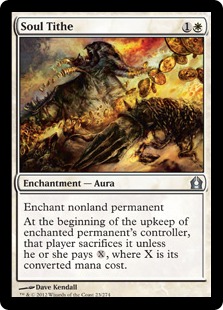If you’ve played Commander for more than 15 minutes, you’ve likely run into one of the most asked questions you can hear in the format:
“Did you pay one?”
This seemingly innocuous question is only outmatched by players asking whose turn it is. Yet this parrot-like inquiry always has players taking note that someone at their table has a Rhystic Study out.
Rhystic Study was just one of a series of cards from the Prophecy set that awarded you some kind of advantage unless another player paid its cost. These cards let you do things like add mana, deal damage, prevent damage, tap creatures, and of course, draw cards. There was even rhystic tutor card called, well, Rhystic Tutor.
Many of these cards were somewhat useful within the set, but in the long run they’ve proved to be too parasitic. Outside of a set that actually cared whether mana was untapped or not (and when mana burn still existed), most of them have not aged well. Rhystic Study, however, has proven to instead be like a fine bottle of wine – it only continues to grow in appreciation since it was created.
Rhystic Study is unlike the other one-time rhystic spells – or very underwhelming permanents – because it provides a continual win-win effect. Either Rhystic Study lets you draw a card whenever your opponent casts a spell, or everything they have costs one more. These cards are known as “taxing” effects, and Prophecy was hardly the first time we’ve seen them. Indeed, although they’ve rarely made a lot of headlines over the years, tax cards have been around since the very beginning.
The majority of these tax cards have been historically Blue, with examples like Slow Motion, Fade Away, or Soul Barrier. That said, while less noticed, it’s been rightly pointed out from designers time and again that White has also long had access to this ability. Classic examples like Cleansing, Tariff, or Brainwash illustrate this.
The color’s access to it did go quiet for awhile, though, while they debated if tax cards matched their revamp of the color wheel. Eventually, their experiments during the Time Spiral block with cards like Mana Tithe and Magus of the Tabernacle showed that not only could taxing still work within White’s philosophy, but as the color of law and order, that it made a lot of sense.
Case in point: four new White tax cards were released during the Return to Ravnica and Theros blocks. And we’re about to look at one of them.
Today we have: Soul Tithe

Name: Soul Tithe
Edition: Return to Ravnica
Rarity: Uncommon
Focus: Permanent Destruction
Highlights: Typically speaking, white is pretty adept at removing…almost anything. As far as removal goes, White is by far the most versatile. It is a master of enchantment destruction, and while support of it has dwindled over time, it also didn’t have issue taking out artifacts. It has access to the widest array of board wipes going, including some that can simply destroy all nonland permanents. (It used to be able to take out lands too.) And if creature removal en masse wasn’t enough, it’s well within its capability to take out creatures on an individual basis too.
To counteract the notion that “White can do it all”, the emergence of Oblivion Ring as its standard bearer removal card helped the game tout the mantra that “White’s answers have answers.” But while O-Ring is certainly handy, especially in Commander, it’s not the best at locking away cards that need to be permanently dispatched. Enter the Soul Tithe tax.
Soul Tithe has three great attributes. First, for just two mana it affects any nonland permanent, from potent artifacts to well-protected planeswalkers. Second, it’s useful at all phases of the game, as it scales along with the cards coming out. No one in the early game wants to spend 5 mana to keep one card around any more than spending 8 to keep something around in the later stages. This means the vast majority of the time, the permanent will be sacrificed.
And if a player is willing to pay the cost…then they’ll likely have a substantial amount of their mana base locked up. Again with the win-win.
Finally, and most importantly, Soul Tithe makes the player sacrifice the permanent. In an era of Commander games with Gods and other indestructible permanents running around, Soul Tithe ensures with ease that those pesky permanents actually go away without worrying about them returning due to some Naturalize effect.
When put together, Soul Tithe makes for a cheap and versatile spot removal card. It also illuminates two simple truths. One, that mana taxing firmly belongs within White’s wheelhouse as it chooses to throw down the bureaucracy hammer in the name of order.
Two, it proves that old axiom that no one likes paying taxes.
Keep an eye out for us to be regularly featuring other more accessible-but-worth-it Commander cards going forward. In the meantime, we’ll keep the light on for you.
![]()
You can discuss this article over on our social media!
Do you have a particular Commander card to suggest for us to shine a future Spotlight on? You can send suggestions to ryan@cardboardrepublic.com
